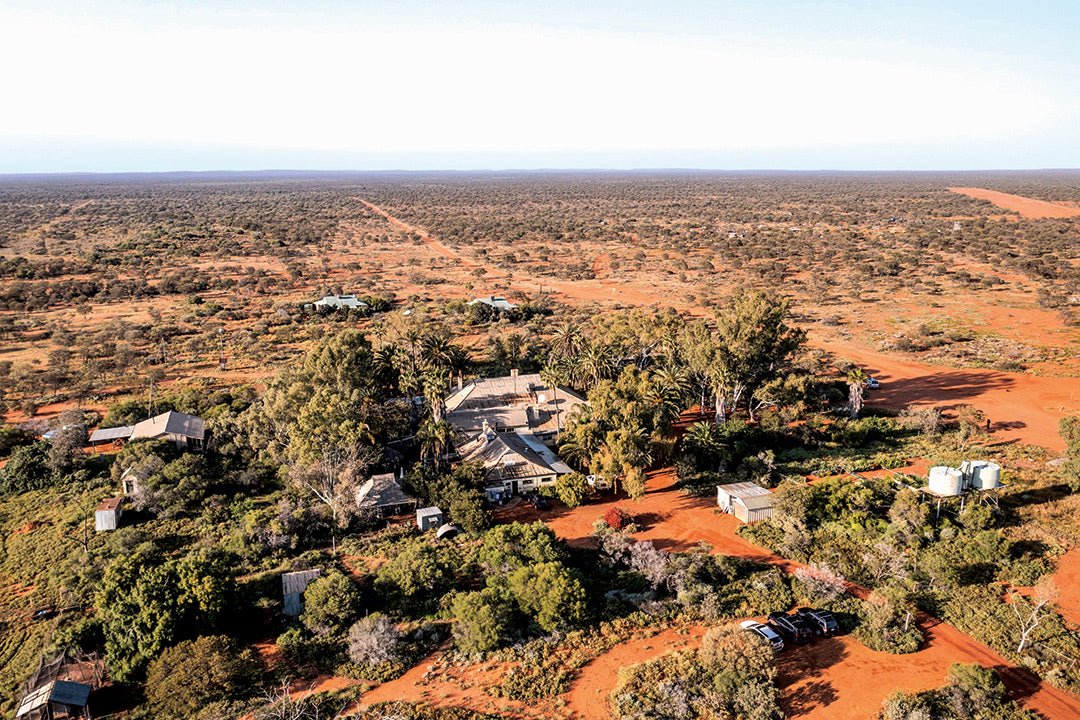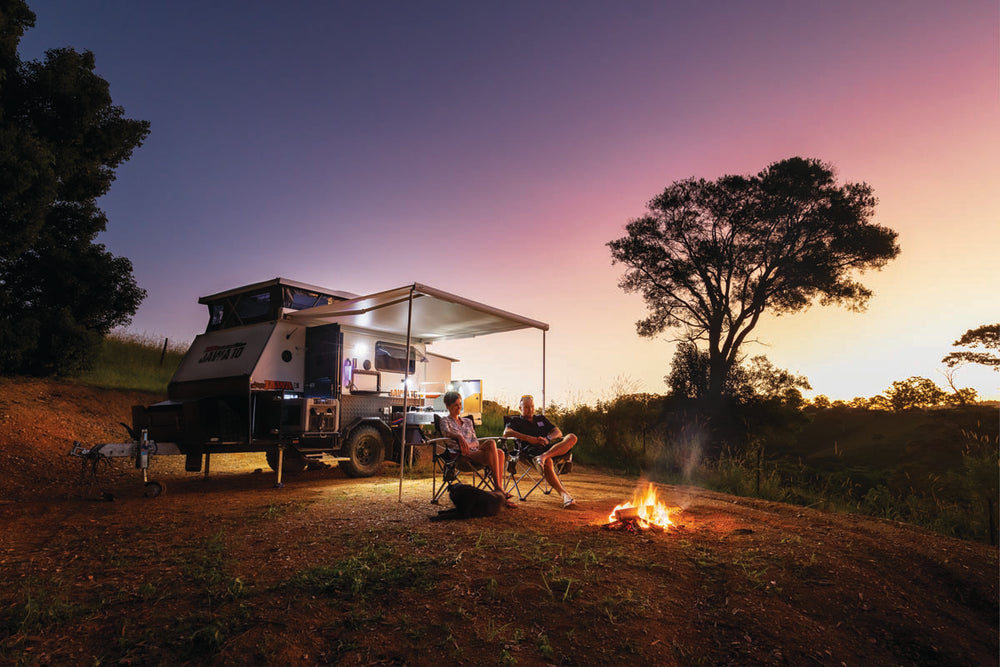

Wooleen Station from the air (Image Tourism WA)
Explore Wooleen Station, where history, conservation and sustainable grazing practices create an unforgettable outback station stay experience in Western Australia’s rugged Murchison region.
Wooleen Station’s quarter of a million acres of mulga scrubland is located in a 3.6-billion-year-old landscape. It is one of 285 pastoral leasehold stations in the 850,000sq km semi-arid Southern Rangelands, in WA’s Murchison region.
Originally founded in 1886, Wooleen’s current owners, David and Frances Pollock, are committed to regenerating and preserving Woolen’s unique ecology and finding a sustainable way to run stock economically. At the same time they are also looking after the environment that has experienced decades of over-stocking, crippling droughts, erosion and land degradation typical in the rangelands. Once a sheep grazing area, stations in the Murchison region now predominantly graze cattle.
The Pollocks say that traditional grazing practices are not sustainable in the rangelands where the average annual rainfall is 200–300mm.
“The rangelands are a renewable resource, but only if the land is managed so that it is able to renew itself and is healthy enough to withstand the normal cycles of climate,” the couple explained.
 Sunset at the Murchison River bush camp
Sunset at the Murchison River bush camp
The Pollocks periodically rest the landscape to allow it to recover from grazing. In 2007 they completely destocked for four years, turned off all the windmills and watering points to discourage kangaroos and wild goats and commenced a vegetation reestablishment program. This was a radical and economically costly move. They now only run cattle in a rotational grazing pattern for a few months of the year during the wetter months.
We joined David’s four-hour afternoon tour and learnt about the importance of perennial arid plants and grasses and the Pollocks’ commitment to land rehabilitation and making Wooleen an ecologically sustainable and viable enterprise. The role of dingoes to manage kangaroos, goats and foxes hasn’t been a popular theory. The tour finished with sunset drinks at spectacular Budura Rock.
 Sunset at Budura Rock (Image Tourism Western Australia)
Sunset at Budura Rock (Image Tourism Western Australia)
Unfortunately, their educational Iconic Dingo Encounter talks had been cancelled due to their resident dingo pair, who were raised in captivity at the Australian Dingo Foundation in Victoria, being shot in late September 2024.
Wooleen’s rehabilitation program hasn’t been easy. To supplement their income, Wooleen offers fully catered accommodation in their Australian National Trust listed homestead, which was built in 1918, and two self-catered fully equipped guesthouses. Further afield there are private bush campsites suitable for caravans along the Murchison River (where we camped), which offer a serene bush experience in the mulga scrub and rocky outcrop country.
 Camping on the Murchison River
Camping on the Murchison River
You can enjoy marked bushwalking and mountain-bike trails with wonderful views, canoeing in the river, guided tours and workshops from April to October. Wooleen’s Visitor Guide includes history, conservation strategies, trail guides and fauna lists.
Wooleen Lake, which only fills every 10 years, is listed in the Directory of Important Wetlands in Australia (DIWA), attracting thousands of birds and drought refuge for fauna. You can also enjoy bird life along the Murchison River and Yewlands Pool. Budgerigars were nesting along the river during our visit. An impressive number of birds, reptiles, mammals, aquatic life and plants have been recorded at Wooleen. Wildflowers attract visitors during spring.
 Birdwatching along the river
Birdwatching along the river
The Pollocks concluded: “It’s not just for Wooleen, it’s about the whole picture. To find a sustainable way to raise cattle in the rangelands. The environment has an extraordinary ability to repair itself, given the chance.”
Plan your trip to Wooleen Station
Wooleen Station is located off Twin Peaks–Wooleen Road, approximately 640km north of Perth and 194km north of Mullewa via a bitumen/gravel road — suitable for all vehicles. Two-wheel drive may not be possible during heavy rain, so always check weather and road conditions before departing. The Murchison Oasis Roadhouse is 35km northwest of Wooleen Station.
Wooleen is part of the Wool Wagon Pathway from Geraldton to Exmouth.
Accommodation:
Fully catered in the homestead, self-catered cabins, bush camping (suitable for caravans). Campsites have fire rings and composting toilets. Collect firewood in designated areas only. There are toilets and showers near the cafe.
On arrival check in at the Milimanmanha cafe, where you can collect a guidebook, maps, purchase local products and buy food. Wi-fi and mobile phone connection are available at the cafe and homestead area.
Dogs are not permitted at the homestead and cabins. They are allowed at the bush campsites and self-drive tracks but must be kept on a lead along the walk trails.
Best time to visit:
April to October. Wooleen is closed to tourists over summer.
Find out more:
You can learn more about Wooleen by reading David’s book: The Wooleen Way: Renewing an Australian Resource.
For more information, head to the Wooleen Station website.
 Nesting budgies on the Murchison River at Wooleen Station
Nesting budgies on the Murchison River at Wooleen Station
THE NEXT STEP
If you want to learn the latest caravan news, find the most innovative new caravans and camping gear or get inspired to plan your next road trip to more WA station stays, subscribe to our weekly newsletter. We promise to send you only the best content.
Explore more of WA’s great station stay experiences:
Bullara Station, WA: The ultimate outback retreat
Detour off the Gibb River Road to Kalumburu, WA
Outback coastal camping at Warroora Station, WA







